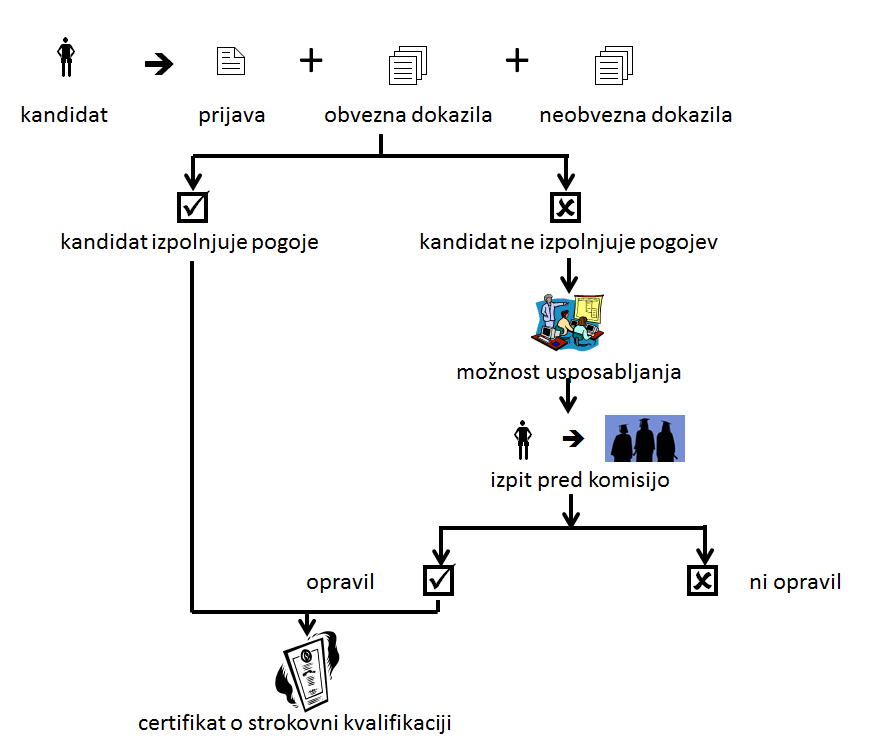Certification of a professional qualification is not just an exam in front of a board, but the whole process from the application form to the award of the certificate of professional qualification. Importantly, the process allows candidates to demonstrate part of their professional qualification, or in exceptional cases the whole of their professional qualification, by means of appropriate additional or optional supporting evidence, which they attach to their application form. Mandatory evidence is that by which the candidate demonstrates that he or she meets the conditions for admission to certification, e.g.:
- proof of completion of education,
- evidence of previous work experience (work book, work contract, reference letter, job description, employer’s statement, etc.),
- other certificates in accordance with the conditions for adherence to the SSKIK certification.
Additional or optional credentials are those that demonstrate the knowledge, skills and competences set out in the professional qualification standard. The additional evidence must be of recent origin and must relate to the candidate. The ZRZ offers assistance in gathering additional evidence. Additional evidence may be:
- a certificate of work and other experience issued by the employer or its official representative,
- reference documents on the candidate’s work,
- a certificate of attendance and completion of formal and non-formal education or training,
- product, model, programme, etc,
- a written product produced by the candidate in the workplace (e.g. a project, plan, development task, research, paper, report, analysis, essay, evaluation report, translation of a text, small business accounts, company staffing plan, etc.),
- photos and videos of work or services at the workplace,
- evidence of any awards or prizes received in competitions relevant to the additional qualification,
- authorship or co-authorship of articles, books and other publications,
- patenet, etc.
Collecting additional evidence to certify a professional qualification makes sense if the candidate has acquired and can demonstrate relevant knowledge, skills and competences through work, hobbies or participation in education or training. The examination itself is based on an examination catalogue. The examination is conducted by a 3-member board of examiners, who check the knowledge, skills and competences of the candidates. If a candidate demonstrates part of his/her knowledge, skills and competences through additional evidence, he/she will not pass the whole examination, but only the remaining part. Certification is therefore:
- reviewing and validating additional evidence,;
- exam;
- and, most commonly, a combination of validation of evidence and an exam.
The certificate awarded to candidates is a reference document that demonstrates certain competences, knowledge and skills. It is not a public document that allows you to continue your education at a higher level, but a document that increases your employability and allows you to find a job in specific fields.
CERTIFICATION PROCESS
OBJECTIONS AND COMPLAINTS
The candidate shall have the right to object to the work of the Examination Board within three days of being notified that the certification has not been passed. The Board shall decide on the objection within a maximum of five days of receipt of the objection or any additional information and may confirm the decision of the original Board, order the issue of the certificate or order a re-examination. Other natural or legal persons (e.g. clients, employers, etc.) may lodge a complaint against the professionalism or quality of the work of the holder of a certificate of professional qualification of the ZRZ, relating to the content of the professional qualification. The Board shall decide on the objection no later than five days after receipt of the objection or any additional information, and may otherwise find that the objection is unfounded or, in the event of a substantiated objection, suspend or withdraw the certificate from the holder.










